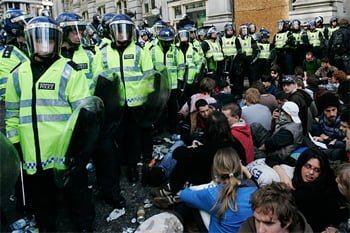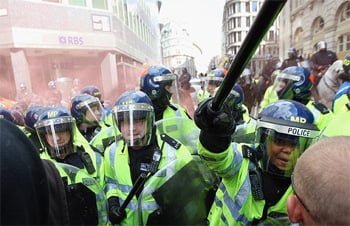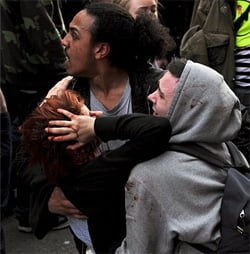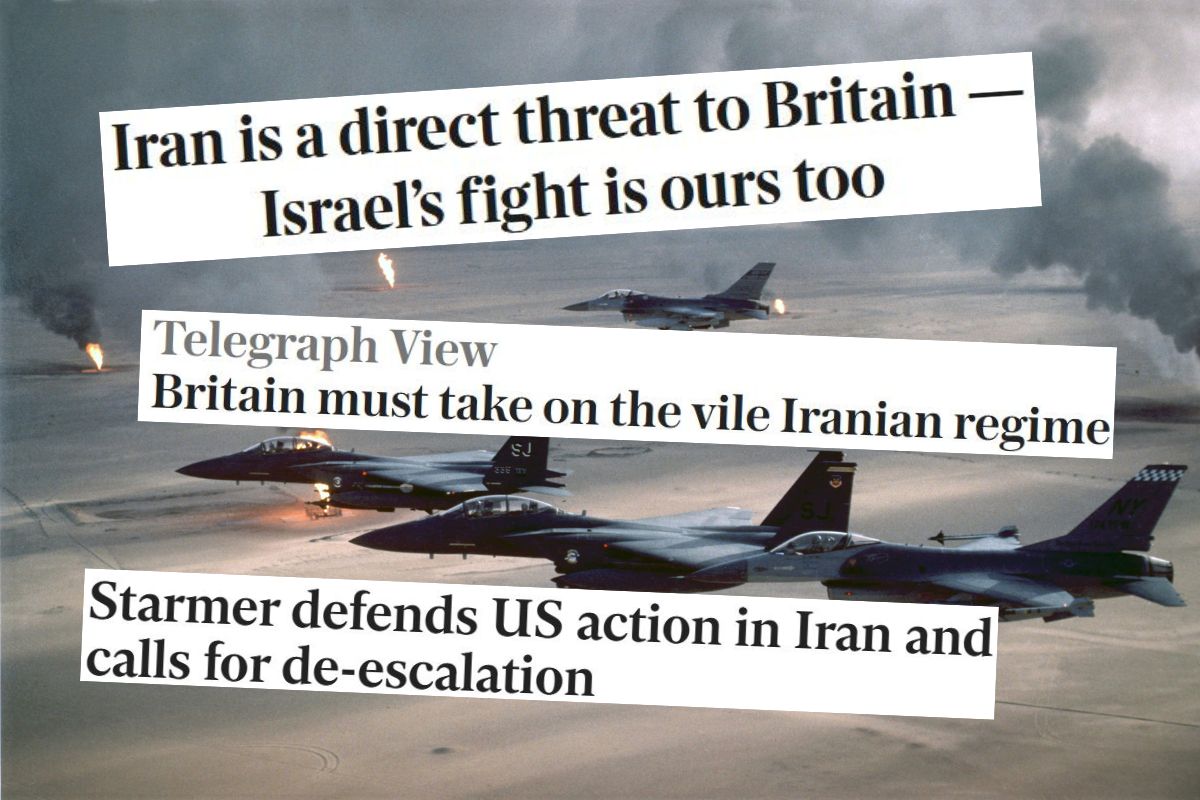At the G20 Meltdown in the early afternoon and Climate Camp
in the evening I saw some unbelievable brutality.

Myself and three other comrades arrived at Liverpool Street
station at 11am for the start of the "G20 Meltdown", where four
different groups were due to march from separate locations and converge at the
Bank of England, protesting over the issues of war, climate change, the
financial crisis, jobs, and housing. When we arrived the police had already
penned in the protestors outside the station and did not seem to be allowing
movement, whilst there was a quiet and tense atmosphere. Soon after we arrived,
the police began escorting the march to the Bank of England. During the brief
march we managed to sell a number of journals and speak to many of the
protestors. The atmosphere was very relaxed at this point, and those that we
spoke to seemed to understand the obvious links between the problems of war,
economic crisis, and climate change.
Upon arriving at the Bank of England things were initially
quite jovial, and there were cheers as the other marches arrived at the same
point. Quickly, however, the mood turned sour, as it became apparent that the
police had begun blocking the road access and were no longer allowing anyone in
or out ‑ a process known as "kettling", due to the way in which
people are restricted from moving, causing the temperature to rise. It is
claimed in the media that this kettling was in reaction to violence from the protestors,
but I believe it was the other way round. As George Monbiot says in his article
in The Guardian, "The police have been talking up violence at the
G20 protests for weeks… The way officers tooled themselves up in riot gear
and waded into a peaceful crowd this afternoon makes it look almost as if they
were trying to ensure that their predictions came true".
It was obvious that there was an extremely small minority of
protestors who were wanting a fight, and this indeed happened briefly as they
took on police in the centre of the crowd. However, the majority of the people
there were peaceful protestors who had come dressed up or with their families
to peacefully express their disgust at the Government and their anger towards
the bankers.

The police then continued to kettle the crowd for another
three hours, blocking all movement away from the area, and denying people
access to water, food, and toilets. This process caused normally peaceful,
pacifist people to react angrily, giving the police the justification they
needed to hit back with violent and brutal attacks. Many innocent people were
walking around with large cuts and bruises having been punched or hit by
police, and there were at least a couple of protestors who were bleeding from
the head. Meanwhile, hundreds of people who just wanted to leave were crushed
up against the police lines. Again, George Monbiot says, "The wildly
disproportionate and unnecessary violence I’ve sometimes seen the police deploy
could scarcely be better designed to provoke a reaction."
After a few hours of being blockaded, there was a brief
opening down one of the roads as police let some of the protestors escape. This
opportunity was brief though, with only a few hundred leaving before the police
blocked the exit again.
Having managed to leave the Bank of England protests, we
then proceeded to Trafalgar Square, where the Stop the War march had converged.
The atmosphere here was completely peaceful, with almost no police and everyone
just standing and listening to the speakers. Many journals were sold and
contacts were made.
I then moved on by myself at about 6pm to visit Climate
Camp, whereby hundred of protestors had set up tents along Bishopsgate Road by
the European Climate Exchange. The mood upon arriving was incredibly vibrant,
with music and dancing alongside talks and poetry. The whole scene was
completely peaceful, and there was no sign of anyone looking to cause any
trouble.
However, just after 7pm, with no provocation at all, riot
police waded in and began blocking the entrances to the camp at either end of
the road. Not only did they block any access to the camp, but they then began
to push protestors back, hitting completely passive people as they innocently
put their hands up in the air chanting "This is not a riot". Tents
and bikes were thrown aside by police as they used extremely brutal force to
push the crowd back and claim another entrance to the road. I saw this all at
close distance, but it was also all captured on video camera and can be seen
here:
{youtube}LF5wJNhgpyo{/youtube}
During this whole process, many protestors were injured and
were then not allowed out to receive treatment. Meanwhile one young man
collapsed and had an epileptic fit, but was not given any help by the police.

Once the police had claimed all the entrances to the camp
they then kettled the crowd for a further four hours, whilst performing a
similarly brutal attack on a crowd of peaceful protestors who had set up on the
other side of the road from the camp. Small skirmishes occurred as peaceful
people were again angered by their imprisonment with no justification or
notification of when it would end. Finally at around 11.30pm we were allowed
out, accompanied by police with barking dogs along the road.
In the camp people could not understand the reason for this,
and were questioning why the police would attack innocent, peaceful people.
There is a misconception that the role of police in society is to protect the
majority of people against a violent minority, but as Marxists we recognise
that actually the opposite is true. The police (like the army, the judicial
system, and the prisons) are only there to protect the interests of the ruling
class, which is an oppressive and exploitative minority, against the rest of
society. In this case, the police were not out to ensure the safety of the
majority, but to protect the bankers and their offices. As Lenin says, in the
last analysis the state is reduced to special bodies of armed men.
More photographs
{mosframe http://picasaweb.google.com/international.marxist.tendency/PoliceBrutalityAtAntiG20Protests#slideshow/,100%,450}
Open the Gallery
See also:
- G20 doing nothing about environmental catastrophe in Bangladesh by Daniel Read (April 2, 2009)
- G20 fiddles while poor starve by Eric Hollies (April 2, 2009)
- G20: capitalism has failed by Socialist Appeal (April 1, 2009)
- G20: Capitalism means war by Patrick Orr (April 1, 2009)
- Marching against the G20 summit in London by Dan Read (April 1, 2009)
- Britain: Through what stage are we passing? by Rob Sewell (March 17, 2009)






